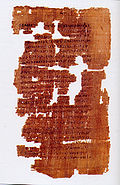
Back Brief aan die Laodisense Afrikaans Epístola als Laodicencs Catalan List Laodikejským Czech Laodikenserbrevet Danish Laodizenerbrief German Epístola a los laodicenses Spanish Paavalin kirje laodikealaisille Finnish Épître aux Laodicéens French Brief oan de Laodikers Frisian האיגרת אל הלאודיקיאנים HE
| Part of a series on |
| New Testament apocrypha |
|---|
 |
|
|
The Epistle to the Laodiceans is a possible writing of Paul the Apostle, the original existence of which is inferred from an instruction in the Epistle to the Colossians that the congregation should send their letter to the believing community in Laodicea, and likewise obtain a copy of the letter "from Laodicea" (Greek: ἐκ Λαοδικείας, ek Laodikeas).[1]
And when this letter has been read among you, have it read also in the church of the Laodiceans; and see that you read also the letter from Laodicea.
— Colossians 4:16 (NRSV)[2]
This letter is generally regarded as being lost. However, some ancient sources, such as Hippolytus of Rome, and some modern scholars consider that the epistle "from Laodicea" was never a lost epistle, but rather Paul re-using one of his other letters (the most common candidate is the canonical Epistle to the Ephesians), just as he asks for the copying and forwarding of the Letter to Colossians to Laodicea. An additional complication is that many scholars do not believe that Colossians was itself written by Paul, in which case the indicated letter might itself not be Pauline even if it existed.
At least two ancient texts claimed to be the missing "Epistle to the Laodiceans" are known to have existed. These are generally considered, both in antiquity and by modern scholarship, to be attempts to supply a forged copy of a lost document.[3] The sole version that survived is a Latin Epistola ad Laodicenses ("Epistle to the Laodiceans"), first witnessed in Codex Fuldensis. The Latin epistle is actually a short compilation of verses from other Pauline epistles, principally Philippians. It too is generally considered a "clumsy forgery" and an attempt to fill the "gap" suggested by Colossians 4:16. Despite this, it was part of medieval Bibles in the Western, Latin church for centuries, with it only becoming clearly non-canonical after it was rejected by both the Protestant reformers and the Catholic Council of Trent in the early modern era.[citation needed]
- ^ Watson E. Mills; Roger Aubrey Bullard (1990). Mercer Dictionary of the Bible. Mercer University Press. p. 500. ISBN 978-0-86554-373-7.
- ^ Cite error: The named reference
col416was invoked but never defined (see the help page). - ^ Cite error: The named reference
Ehrmanwas invoked but never defined (see the help page).